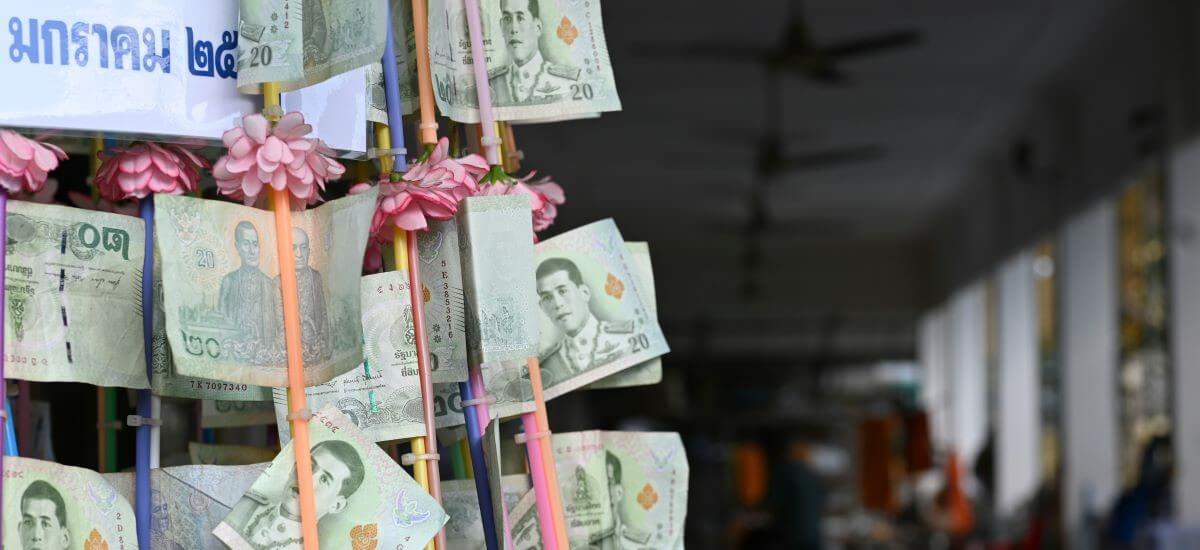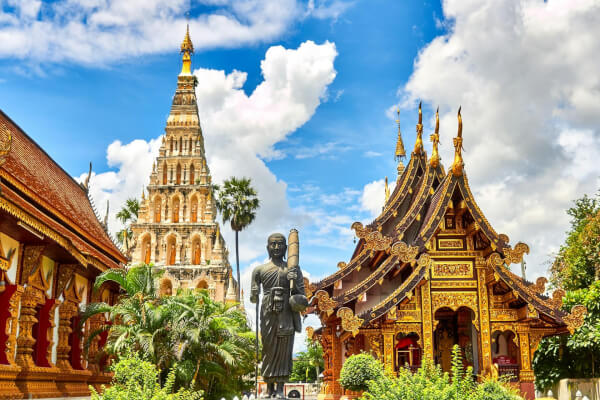Best travel cards for Thailand in the UK
Read our guide on the best travel card for Thailand, including card comparisons and travel tips.

Travelling to Thailand? Whether it’s a holiday or a longer stay, it can be useful to know a little about Thailand’s currency, money and banks.
In this article, we’ll give you an idea of what to expect when you land, with an overview of Thailand’s currency, banks and exchange services.
From currency exchange tips to ATM finder tools, we’ll help you manage your money like a pro and get more baht for your buck.
So, let’s dive right in.
The official currency in Thailand is the Thai baht, or THB. Both coins and banknotes are used there.
To find out how many baht you can get for your pounds, use our currency converter.

Here are a handful of useful-to-know facts about Thailand’s currency:
If you’re visiting Thailand from the UK, you’ll need to find the best way to exchange your GBP to THB - and get the best deal.
To make your spending money go further during your trip, follow these top tips for exchanging currency in Thailand:
If you wish, you can change currency when you get to Thailand. Generally speaking, the exchange rates for THB will be better in Thailand than at home in the UK.
However, you need to choose your currency exchange provider very carefully. Exchange services in Thailand tend to claim ‘zero commission’ - but make sure you can see the exchange rate being offered. Usually, when services advertise a service without commission or fees, their profit is wrapped up in the poor exchange rate they offer.
To avoid this, make sure you get to know the mid-market exchange rate for your chosen currency pair. Also known as the interbank exchange rate, this is the midpoint between the buy rate and the sell rate in global currency markets.
It is the ‘truest’ rate, not subject to markups by exchange desks. By using an online currency converter before switching out your home currency for THB, you’ll get an idea what your money is actually worth and be better prepared to spot tourist traps.
There are currency exchange desks in international airports and hotels which makes changing cash on arrival seem easy.
However, exchange rates in these places are notoriously poor, so they really should only be a last resort. If you do need to use them, make sure you’re comfortable with the offer before you commit. If necessary, exchange only a small amount and seek a better deal in town.
Alternatively, there will be ATMs available which allow you to withdraw some Baht to tide you over.
A note of warning - currency exchange desks may refuse to change banknotes which are in any way damaged or defaced. Make sure that whatever cash you bring is crisp and clean.
All major credit and debit cards are accepted in large businesses, hotels and restaurants in Thailand. However, you might find that smaller stores and cafes don’t take cards. So, it could be a good idea to carry some cash on you at all times.
If you’re spending on a card, make sure you tell your home bank before heading out to Thailand. Otherwise, there’s a risk that your transactions will be flagged up as fraud.
And if asked, always choose to pay in the local currency (THB), or you could end up with a poor exchange rate.
You should also check that your bank doesn’t have any foreign transaction fees for spending abroad on your debit card.
If it does, an alternative such as the Wise card could be a better alternative for spending in Thailand. It works in 150+ countries wherever cards are accepted and has no foreign transaction fees. Even better, it automatically converts the currency at the mid-market rate whenever you spend, for just a small conversion fee*.
So if you don’t fancy carrying cash around with you, but your bank charges fees to use your debit card abroad, the Wise card is the ideal solution.
And if you’re thinking about opening an account in Thailand, the Wise account could be a convenient and money-saving option.
There’s a wide network of ATMs in Thailand. Cash is the preferred method of payment for most Thai people, so using an ATM to make withdrawals can be a convenient option for travellers.
To help you find the most convenient ATMs close to where you’re staying in Thailand, check out these online locators:
There may be occasions when you do need the services of a bank while in Thailand. For example, if you need to wire some money or open a local Thai bank account.
Thailand has a good banking network, the largest institution being Bangkok Bank.
Other major retail banks in Thailand include:
International banks operating in Thailand:
See a full list of banks in Thailand here.
It could also be an idea to check with your home bank if they work in partnership with any Thai banks. If they do, you might be able to use ATMs in their network for free (or at least with reduced fees).
If you’re looking to open up a bank account in Thailand, a couple of the most expat-friendly banks to check out include:
A bank isn’t the only way to manage your money in a new country. You could find it easier and even cheaper to use an alternative such as Wise.
Open a Wise multi-currency account and you can hold, send, spend, receive and convert money in a whopping 40 currencies at once - and all online.
You can also send money back to the UK and worldwide at the mid-market exchange rate for low fees*.
There’s even the Wise card for spending in 150+ countries, including Thailand. It automatically converts your money to the local currency at the mid-market exchange rate, whenever you spend.
Plus, you can keep track of it all on the move using the handy Wise app. Find out more about Wise products below 👇
Still have a burning question about money, banks and currency in Thailand? You might find the answer in our FAQs below.
Cash is still commonly used in Thailand, especially in more rural and remote areas. You’ll be able to use a card in major cities, large hotels and restaurants and in touristy areas. However, it’s always a good idea to have some cash on you for day-to-day spending.
Traveller’s cheques are sometimes, although not commonly, used in Thailand. You should be able to cash them at one of the major banks in a city branch, but there may be a fee to pay.2
You can bring up to 500,000 Thai baht into Thailand. In foreign currency, you can bring the equivalent of up to 20,000 USD (approx. £15,700) into the country. If you exceed these limits, you’ll need to make a declaration to customs officials or you’ll be breaking the law.3
ATMs in Thailand can be quite expensive, as most tend to charge withdrawal fees. Although the exact fee can vary between banks and operators, you can expect to pay around 300 baht (approx. £6.50) per withdrawal.4
Sources used for this article:
Sources checked on 15-04-2024.
*Please see terms of use and product availability for your region or visit Wise fees and pricing for the most up to date pricing and fee information.
This publication is provided for general information purposes and does not constitute legal, tax or other professional advice from Wise Payments Limited or its subsidiaries and its affiliates, and it is not intended as a substitute for obtaining advice from a financial advisor or any other professional.
We make no representations, warranties or guarantees, whether expressed or implied, that the content in the publication is accurate, complete or up to date.

Read our guide on the best travel card for Thailand, including card comparisons and travel tips.

Learn how to claim your VAT refund in Thailand with our comprehensive guide, perfect for UK travellers. Discover the VAT refund process to maximise your savings

Can I use my Starling card in Thailand? Find out everything you need to know about using Starling Bank overseas in our handy guide.

Should you pay with cash or card in Thailand? Explore our helpful guide on Thai currency, cash etiquette, ATMs and using your UK card.

Check out our in-depth guide on everything you need to know about buying a prepaid SIM card for Thailand, including different providers, pricing, and features.

A handy guide on how Revolut works in Thailand, including info for UK customers on using a Revolut card abroad.